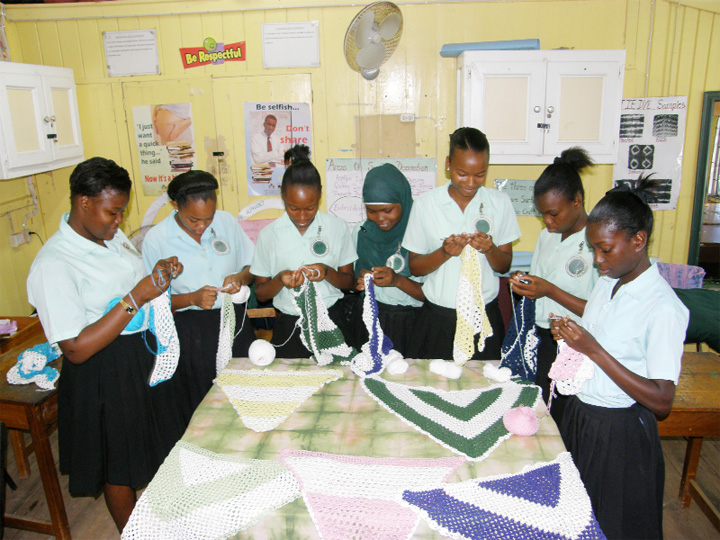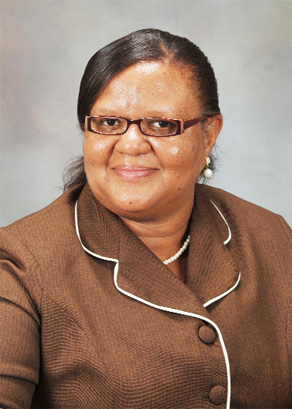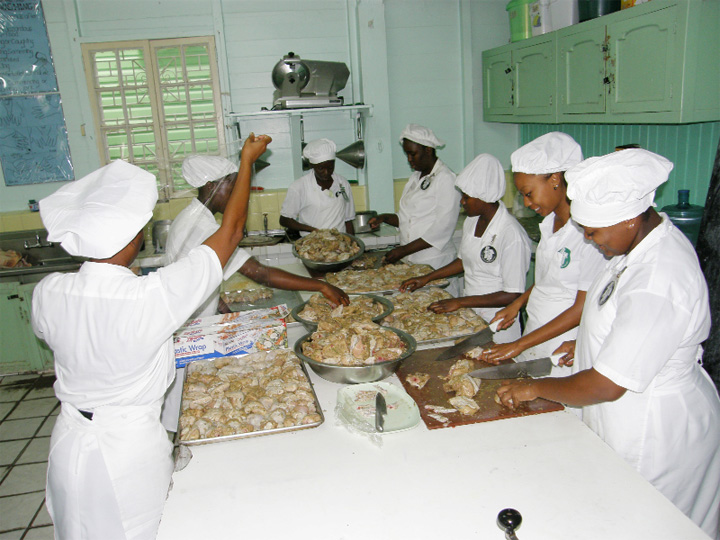Eighty years ago the Carnegie Trade School, now the Carnegie School of Home Economics, opened its doors with the objective of relieving unemployment among women, something that was accomplished in the early stages mainly by making uniforms for postal workers.
Today the school has moved far from that role and has its feet firmly planted in the development of tourism and hospitality sector as it educates women − and some men − in domestic science, cosmetology, household management and the visual arts.
The important role the school plays in Guyana’s tourism sector is best illustrated in the words of the Director of the Guyana Tourism Authority Indranauth Haralsingh who in his message to mark the school’s 80th anniversary said over the years the “hospitality tapestry in Guyana has been tightly interwoven with the Carnegie School of Home Economics and the training it has imparted.”
She said that it was in the last ten years that the hospitality and tourism sector had been making great demands on the institution to train workers.
But the school’s head, Penelope Harris told the Sunday Stabroek in a recent interview that for the school to fully fulfil this role it needs to move from the D’Urban and High Streets location as security and space constraints are two major problems.
Haralsingh said that the constant increase in visitor arrivals including technocrats and North Americans of Guyanese ancestry, has given the school the challenge of satisfying a unique market.
“The institution has to respond to our brand of tourism and focus on areas such as resort management and the passing on of Guyanese culinary skills through edu-tours,” he emphasized.

Today the school is working towards achieving those goals but Harris said there would be need for major changes even as the school along with other technical and vocational institution works towards granting students Caribbean certification.
‘Developing the institution’
“[When the school started] the whole idea was to relieve unemployment among women; it was a successful venture and the then government took over the school and they expanded it it into doing domestic sciences,” Harris told this newspaper.
While initially the school only made uniforms for postal workers, later all areas of domestic science were included in the curriculum. Later on in the fifties, teacher training started at the school’s location where teachers of home economics were trained at the same time as they attended the Cyril Potter College of Education. They would visit Carnegie two days a week for the practical aspect of the subjects. This was discontinued after the college moved to its Turkyen location.
It was in the last 20 years that the school’s programme expanded to include subjects such as cosmetology, interior decoration and aspects of hospitality.

“We are in the process of developing the institution further and upgrading it, expanding the programme offering higher level programmes, and we are working towards accreditation so there is a whole lot that is happening right now,” Harris said.
But she admitted that the expansion and improvement are happening “slower than we would like,” even though there have been “improvements all around.”
And Carnegie, like the other technical and vocation institutions under the auspices of the Ministry of Education, is moving toward competency-based education and training, which is a “different mode of delivery to the traditional mode.”
“In the competency based mode there are particular occupational competencies that each student has to achieve. So it is not just that you passed or you failed, you have to show competency in every occupational area in order to be certified,” Harris explained.
She revealed that while it is a national certification it is also a Caribbean qualification. She said all the technical and vocational schools started pilot competence-based education and training from last September. At the school the programmes which are being piloted are cosmetology and commercial food preparation. In addition to these the school offers garment construction, interior decoration, catering and hospitality and visual arts.
By next September they all should be fully on stream as Harris noted that it is during the pilot they would attempt to iron out all the difficulties even though “it calls for a little more meticulous record-keeping because each student has to display each competence.” Every occupational area may have about 20 competencies and as such this requires a lot of record- keeping and tracking of students.
Harris said that the students have to sign an agreement at the beginning of their programme to complete the competencies.
“It is a lot of monitoring but we are getting there. I think our biggest obstacle or difficulty with that programme is the facility standard, because our facility is supposed to be on par with the rest of the Caribbean and we have some difficulties attaining those standards,” Harris said.
Asked what the school is lacking she responded that there is need for equipment and more space since there are specific requirements as to how much space each student should have to operate in. They also have to have adequate toilet facilities and drinking water, among other things.
“We are working on them; this year we are scheduled to buy quite a bit of equipment from our capital budget and we have been expanding the facility,” Harris said, adding however, that there are two new training rooms which are still under construction.
The qualification is called the Carib-bean Vocation Qualification (CVQ) and at the national level it is called the National Vocation Qualification (NVQ).
Relocation
And for the school to really thrive in the area of hospitality and tourism Harris said that it has to be relocated.
“Certainly in the area of hospitality and tourism, if we are going to do that type of training it is expedient or it is the best thing for us to actually be in an attractive location for tourists…” Harris said.
She said most training schools in the regions not only offer catering services, which Carnegie does, but they also offer lodging facilities and this service the school is unable to offer.
“Security becomes a big issue for tourists and this area is not very attractive where this is concerned, but we are hoping to have an attractive location where that training can be adequately carried out,” Harris said.
It is hoped that this will be done in the medium or short term as the demands are very great since the hospitality industry in Guyana “is about to take off − I wouldn’t say it has taken off.” She said there are many business persons who are looking at the school to provide trained staff, and for this to be done adequately they need to have adequate facilities. She hopes that the private sector would give support and that the government would take the initiative as soon as possible.
“In fact we are hoping that in this year’s budget we would get something positive in terms of the hospitality training because the request has been made,” she said.
And several areas have been suggested for relocating the school, and Harris is confident that land is available to build a new school.
Carnegie receives a lot of requests from industries to train persons who are already employed, because while they may have competencies they are not certified. And the school’s head said this is where the competency-based training would work well as it takes prior learning into consideration. She said for many craftsmen and women who are already on the job market − and this is throughout the Caribbean − the gaps may be found in their communication, literacy and computer skills, which are all areas that have to be completed for one to be granted full certification.
Concerned
The basic qualification to enter Carnegie is four CSEC subjects, but there are exceptions for adult persons who are already working in the industry. The school does not have many problems with them since they are usually committed to becoming certified.
There is also space for students who have dropped out of secondary school, but they would have first to write an entrance examination (at Grade 9 level). They are interviewed and then are taken through a one-year house management programme before they are placed in the vocational programme.
Sadly, Harris said they only accept about 40% of those persons that take the entrance examination since “unfortunately the pass rate of the entrance test is very low and it is not only here, it seems to be a national problem.”
“We are very concerned about this; we believe that education needs to be looked at from the nursery level right up, because it is very sad that so many people would drop out of school. The drop rate in secondary school is very, very high,” she said.
While it does not directly concern the school, she expressed herself personally worried about what happens to those young drop-outs when they do not gain entrance to an institution. All the technical and vocational schools have an entrance requirement.
However, she said the Ministry of Education has begun to address the problem with the secondary competency programme and once the student is successful at this they will then gain entrance to a technical institution.
“For a lot of students it provides a motivation for them to remain in secondary school, so that is helping. But it seems not to be enough,” Harris said, adding that the school encourages its students who have not written CSEC to do this, as some persons are late developers.
The school once offered the examination but this has been discontinued. However, Harris said that once they have the facilities and teachers it would be possible for students to sit the examination.
Harris practically grew up at the school since her mother was pregnant with her while working at the school, and she would tell you that she “grow up running around the school.” She has been at the school for 20 years and has acted as the head since 2007, but was appointed to the substantive position last year. She is a trained teacher and has also studied in Poland where she majored in human nutrition. It was upon her return from there that she joined Carnegie, never imagining she would have been there this long.
“But it brings me a lot of satisfaction, especially when children return, those who might be living overseas and doing well, they return and say they are so glad that they came here and it made all the differences in their lives − that really motivates me,” Harris said.
The school was first headed by British born B Bryant who was followed by Lucille Fraser, Magda Pollard, Lynette Sylvester, Aulene Kilkelly, Roxanne Benjamin-Hoppie and Norma Washington.






